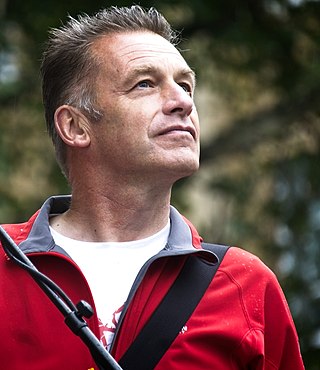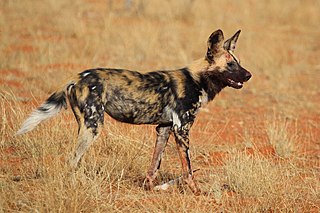Related Research Articles

The cheetah is a large cat native to Africa and central Iran. It is the fastest land animal, estimated to be capable of running at 80 to 128 km/h with the fastest reliably recorded speeds being 93 and 98 km/h, and as such has evolved specialized adaptations for speed, including a light build, long thin legs and a long tail. It typically reaches 67–94 cm (26–37 in) at the shoulder, and the head-and-body length is between 1.1 and 1.5 m. Adults weigh between 21 and 72 kg. Its head is small and rounded, with a short snout and black tear-like facial streaks. The coat is typically tawny to creamy white or pale buff and is mostly covered with evenly spaced, solid black spots. Four subspecies are recognised.

A game reserve is a large area of land where wild animals live safely or are hunted in a controlled way for sport. If hunting is prohibited, a game reserve may be considered a nature reserve; however, the focus of a game reserve is specifically the animals (fauna), whereas a nature reserve is also, if not equally, concerned with all aspects of native biota of the area.

Trophy hunting is a form of hunting for sport in which parts of the hunted wild animals are kept and displayed as trophies. The animal being targeted, known as the "game", is typically a mature male specimen from a popular species of collectable interests, usually of large sizes, holding impressive horns/antlers or magnificent furs/manes. Most trophies consist of only select parts of the animal, which are prepared for display by a taxidermist. The parts most commonly kept vary by species, but often include head, skin/hide, tusks, horns, and/or antlers.

Christopher Gary Packham CBE is an English naturalist, nature photographer, television presenter and author, best known for his television work including the CBBC children's nature series The Really Wild Show from 1986 to 1995. He has also presented the BBC nature series Springwatch, including Autumnwatch and Winterwatch, since 2009.

Liuwa Plain National Park is a 3,369-square-kilometre (1,301 sq mi) national park in Zambia's Western Province. "Liuwa" means "plain" in the local Liuwa language, a dialect of Lozi language, and the plains originally served as a hunting ground for Lubosi Lewanika, the Litunga of the Lozi people. The area was designated as a protected area by Lubosi Lewanika in the early 1880s, and as a national park in 1972, when Zambia's government took over management. The nonprofit conservation organization African Parks has managed Liuwa in partnership with the Department of National Parks and Wildlife and the Barotse Royal Establishment since 2003.

The Nature Conservation Foundation is a non-governmental wildlife conservation and research organisation based in Mysore, India. They promote the use of science for wildlife conservation in India.

Chipangali Wildlife Orphanage is a not-for-profit organisation dedicated to the rescue and care of orphaned, injured, abandoned, abused or confiscated wild animals in southern Africa. It is located in Bulawayo, Zimbabwe.

Human–wildlife conflict (HWC) refers to the negative interactions between human and wild animals, with undesirable consequences both for people and their resources, on the one hand, and wildlife and their habitats on the other. HWC, caused by competition for natural resources between human and wildlife, influences human food security and the well-being of both humans and animals. In many regions, the number of these conflicts has increased in recent decades as a result of human population growth and the transformation of land use.

The African wild dog, also called the painted dog or Cape hunting dog, is a wild canine which is a native species to sub-Saharan Africa. It is the largest wild canine in Africa, and the only extant member of the genus Lycaon, which is distinguished from Canis by dentition highly specialised for a hypercarnivorous diet, and by a lack of dewclaws. It is estimated that about 6,600 adults live in 39 subpopulations that are all threatened by habitat fragmentation, human persecution, and outbreaks of disease. As the largest subpopulation probably comprises fewer than 250 individuals, the African wild dog has been listed as endangered on the IUCN Red List since 1990.

Panthera Corporation, or Panthera, is a charitable organization devoted to preserving wild cats and their ecosystems around the globe. Founded in 2006, Panthera is devoted to the conservation of the world’s 40 species of wild cats and the vast ecosystems they inhabit. Their team of biologists, data scientists, law enforcement experts and wild cat advocates studies and protects the seven species of big cats: cheetahs, jaguars, leopards, lions, pumas, snow leopards and tigers. Panthera also creates targeted conservation strategies for the world’s most threatened and overlooked small cats, such as fishing cats, ocelots and Andean cats. The organization has offices in New York City and Europe, as well as offices in Mesoamerica, South America, Africa and Asia.
The Naankuse Foundation Wildlife Sanctuary, also stylized Nǀaʼankusê, is a wildlife sanctuary in central Namibia, situated c. 42 kilometres (26 mi) outside Windhoek. Besides the sanctuary the establishment also runs a carnivore conservation research programme, the Clever Cubs pre-primary school, and a clinic for the San people. Nǀaʼankusê is a Juǀ'hoan word that means "God will protect us", or "God watches over us." The sanctuary opened in 2007. It is run by Namibian conservationist Marlice van Vuuren and her husband Rudie van Vuuren. Naankuse is funded by voluntary donations and relies on the time of volunteers to continue its projects.

Chris Morgan is a British-born ecologist, conservationist, TV host, filmmaker, podcaster, and author. His ecology and conservation work focuses on bears and other large carnivores worldwide. Over the last 25 years Morgan has worked as a wildlife researcher, wilderness guide, and environmental educator on every continent where bears exist.
Dr. Krithi Karanth is Chief Conservation Scientist and Director at the Centre for Wildlife Studies, Bangalore, Adjunct Faculty at Duke University and National Centre for Biological Sciences.

Human–lion conflict refers to the pattern of problematic interactions between native people and lions. Conflict with humans is a major contributor of the decline in lion populations in Africa. Habitat loss and fragmentation due to conversion of land for agriculture has forced lions to live in closer proximity to human settlements. As a result, conflict is often characterized by lions preying upon livestock, known as livestock depredation. When depredation events take place, farmers suffer financial losses and lions face threats of retaliatory killing.
Tourism in Zambia relates to tourism in the African nation Zambia. The tourism industry is a major and growing industry in Zambia. Zambia has more than 2500 lions along with several National parks, waterfalls, lakes, rivers, and historic monuments. Zambia has been involved in several agreements on tourism with nations like Uganda and Kenya. Uganda Ministry of Tourism and Arts said Zambia is a model in tourism in Africa. Zambia Tourism Agency (ZTA) has partnered with the Government through the Ministry of Tourism and private sector to enhance the marketing aspect in the tourism industry.

Asha de Vos (Sinhala:ආශා ඩි වොස් is a Sri Lankan marine biologist, ocean educator and pioneer of blue whale research within the northern Indian Ocean. She is known for her Blue Whale Project. She is a Senior TED Fellow and was chosen for a BBC 100 Women award in 2018. She is a National Geographic 2016 Emerging Explorer Grantee.
Will Burrard-Lucas, is a British wildlife photographer and entrepreneur. He is known for developing devices, such as BeetleCam and camera traps, which enable him to capture close-up photographs of wildlife.
The Women of Discovery Awards are given by the non-profit WINGS WorldQuest, in recognition of the achievements of women in science and exploration. The awards were first presented in 2003, the same year that WINGS WorldQuest was formed by Milbry Polk and Leila Hadley Luce. Both the Board of Directors and a Junior Council at the granting organization, WINGS WorldQuest, are involved in selecting the recipients of the Women of Discovery Awards, who are thereafter known as Fellows.
The WINGS Women of Discovery Awards and Fellows Program were established to celebrate the ground-breaking work of women explorers and scientists who are actively out in the field today and provide critical, unrestricted funding to support and ensure continued study.

Yadvendradev Vikramsinh Jhala, popularly addressed by his family name Jhala, is an Indian scientist and conservationist. He is the current dean and a senior professor at the Wildlife Institute of India, Dehradun. Over the past three decades, he has studied animals in tropical forest and arid ecosystems and trained a multitude of wildlife professionals across the world.
Amelia Jane Dickman is Professor of Wildlife Conservation and Director of WildCRU at the University of Oxford, Kaplan Senior Research Fellow at Pembroke College, Oxford and joint CEO of Lion Landscapes. She is best known for her leadership of the Ruaha Carnivore Project, seeking to improve conservation outcomes for lions and other carnivores in the Ruaha National Park of Tanzania. She is known for her views on the importance of scientific and local community input into discussions around the continued importance of trophy hunting for the conservation of African landscapes.
References
- 1 2 3 Nunez, Christina (2016). "Emerging Explorer: Thandiwe Mweetwa". National Geographic. Retrieved 2 June 2018.
- ↑ "Our People". Zambian Carnivore Programme. Retrieved 2 June 2018.
- 1 2 Fortis, Bianca. "Women of Discovery: Q & A with Thandiwe Mweetwa". WINGS WorldQuest. Retrieved 2 June 2018.
- ↑ "Thandiwe Mweetwa featured in BBC ONE documentary The Hunt". University of Arizona School of Natural Resources and the Environment. 24 February 2016. Retrieved 2 June 2018.
- ↑ "Former Pestalozzi students helping to change the world for the better". Hastings & St. Leonards Observer. June 25, 2018. Retrieved 9 July 2018.